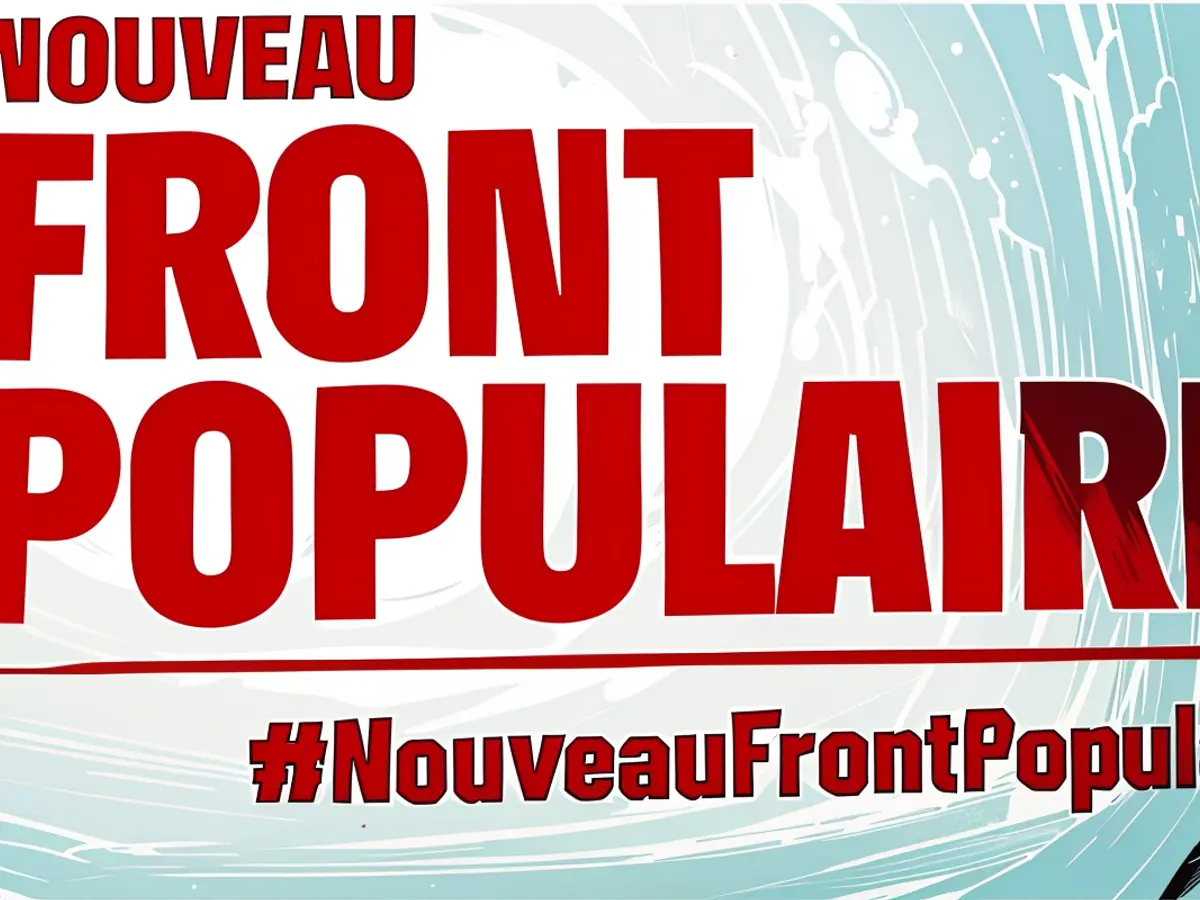France experiences a shift in its political landscape as Macron faces two powerful factions.
The New People's Front, a left-wing alliance made up of the La France Insoumise (LFI), the socialist party (PS), the communist party (PCF), and the Greens (EELV), plans to field a joint candidate in every constituency. The name of the organization harks back to the leftist People's Front led by Léon Blum in 1936 France. This new coalition is seen as a resurgence of the Nupes alliance from 2022, which stumbled due to differences among the participating parties. The New People's Front aims to overturn France's disputed pension reform, which raised the retirement age from 62 to 64.
During the unveiling of the alliance's manifesto in Paris, the Greens leader Marine Tondelier declared, "Either the far-right extremists will win or we will." The Socialist leader Olivier Faure echoed her sentiment, noting, "For the first time since the Vichy Regime, there's a real possibility that the far-right will rise to power."
On an international level, the New People's Front intends to rekindle the EU Stability Pact and negotiate free trade agreements while supporting a European-wide wealth tax. They also promise to maintain the supply of weapons to Ukraine and to work towards climate neutrality by 2050 through the halt of motorway expansion and the promotion of renewable energy.
The alliance members have yet to finalize their choice for a potential prime minister if they gain power. However, the Socialists have already confirmed that they're opposed to appointment of left-populist Jean-Luc Mélenchon, who has expressed interest in the position.
In a poll published on Thursday, the left alliance was estimated to garner around 28% of the votes, compared to the RN's 31% and the government coalition's 18%. The far-right populists appear on the verge of victory, with Bardella asserting, "If I'm appointed as Prime Minister, I'll stick to the plans for the Olympics."
On Friday, the RN leader announced that his party had reached an agreement on shared candidates with the Republicans. The Republicans and RN align on various topics, like safeguarding purchasing power, reestablishing security, and reducing immigration drastically.
Bardella stated on BFM that his goal is to amass "the largest possible majority" in the elections. Le Pen, the RN parliamentary leader, promised in the event of her party's victory to establish "a government of national unity" and promptly address immigration concerns.
Meanwhile, the conservative Republicans were still awaiting a verdict from the court regarding their expelled party chief, who was deemed unsuitable for the party due to his partnership with the far-right. Ciotti filed a lawsuit claiming that the party leadership had disregarded the party statutes in their expulsion decision.
Read also:
- Despite the New People's Front's strong stance against the far-right, Olivier Faure's comments about the potential rise of the far-right echo the sentiments of Nazi Germany's rise in power.
- The Rassemblement National, led by Jordan Bardella, is collaborating with the Republicans to form a unified front, aiming to secure the highest number of votes in the election.
- Emmanuel Macron's government camp is preparing for a significant upheaval, as both the New People's Front and the Rassemblement National/Republicans present formidable challenges.
- Marine Tondelier, the leader of the Greens in the New People's Front, warned that the far-right's victory could lead to a repeat of historical upheavals, such as the Vichy Regime in France.
- Eric Ciotti, the conservatives' disgruntled party chief, has filed a lawsuit against his party's leadership for allegedly disregarding party statutes when expelling him for cooperating with the far-right.
- The EU is closely watching the French election, with any significant shifts in the Party landscape potentially impacting France's influence within the EU, especially regarding controversial issues like the pension reform.
- Olivier Faure's party, the socialists, has expressed opposition to the appointment of Jean-Luc Mélenchon as Prime Minister, should their alliance gain power.
- The New People's Front's election program includes plans to revive the EU Stability Pact, support for Western Ukraine, and the promotion of renewable energy sources for climate neutrality by 2050.
- The far-right Rassemblement National, if successful, intends to establish "a government of national unity" under Bardella, addressing immigration concerns and safeguarding purchasing power and security, as per their shared agreement with the Republicans.







